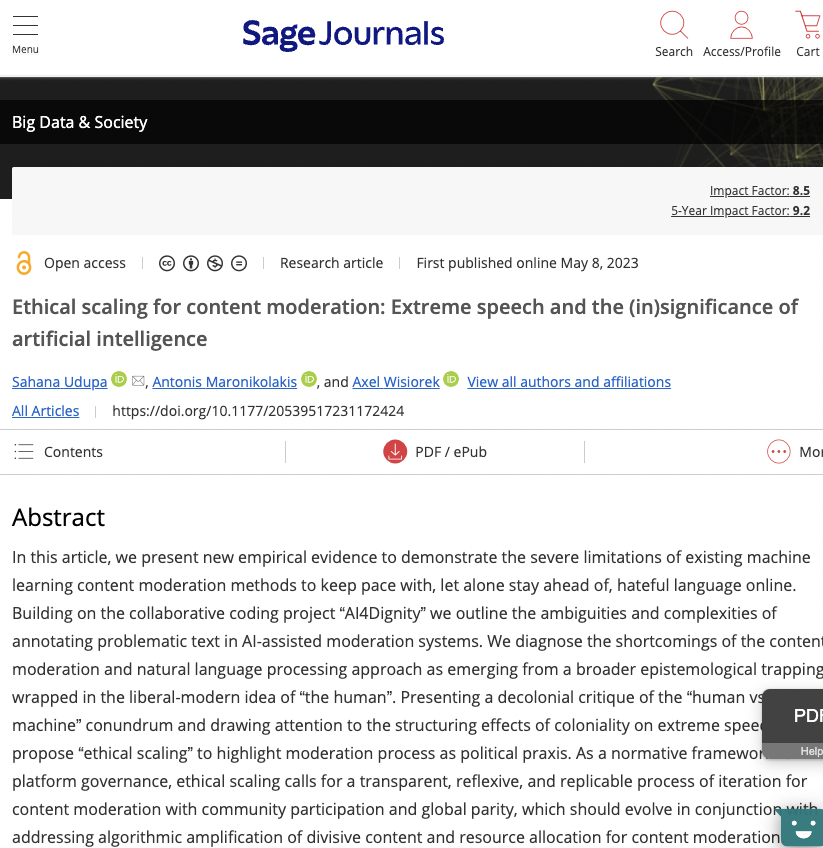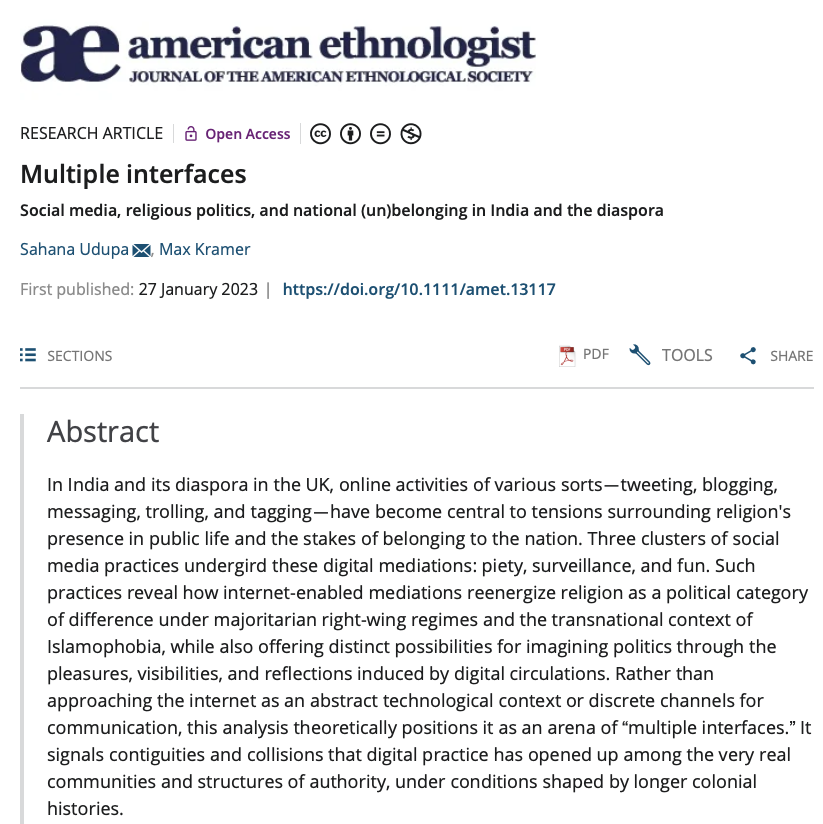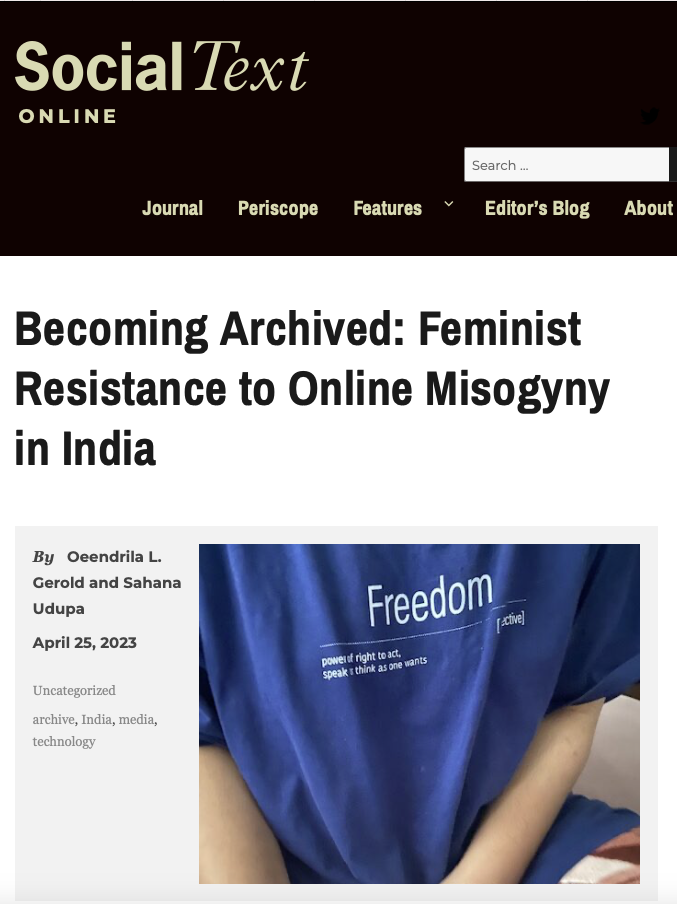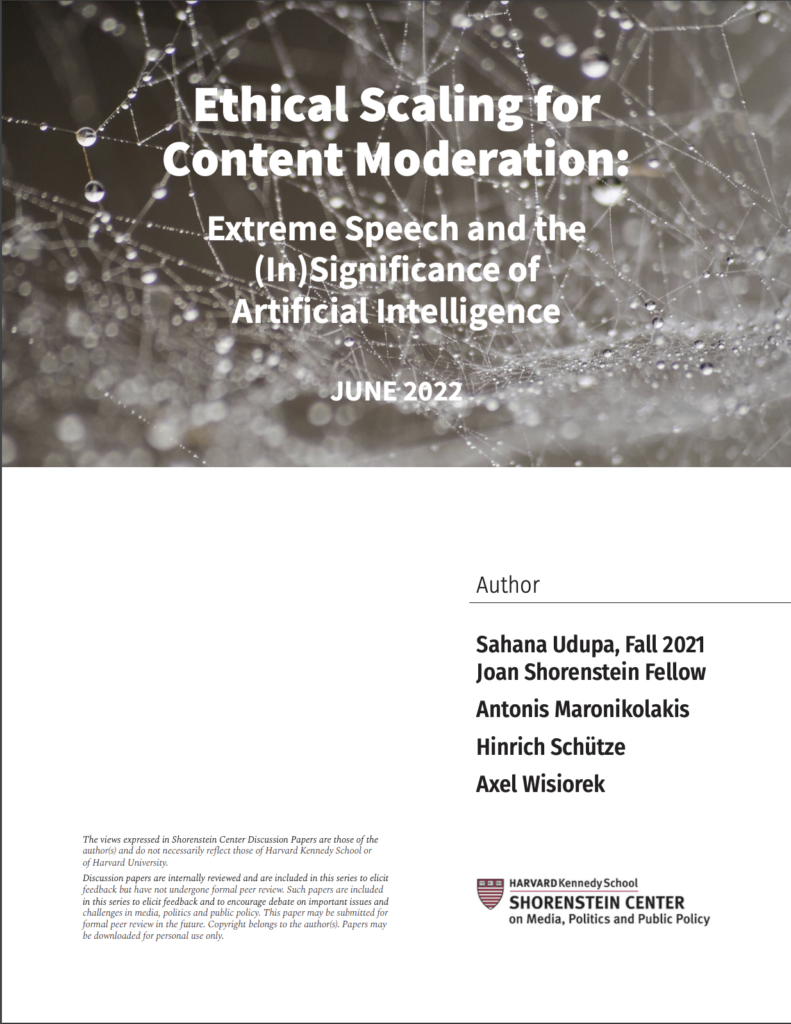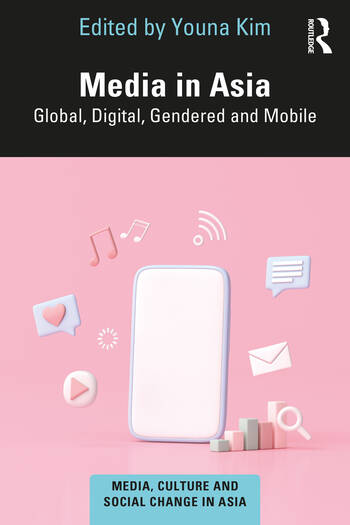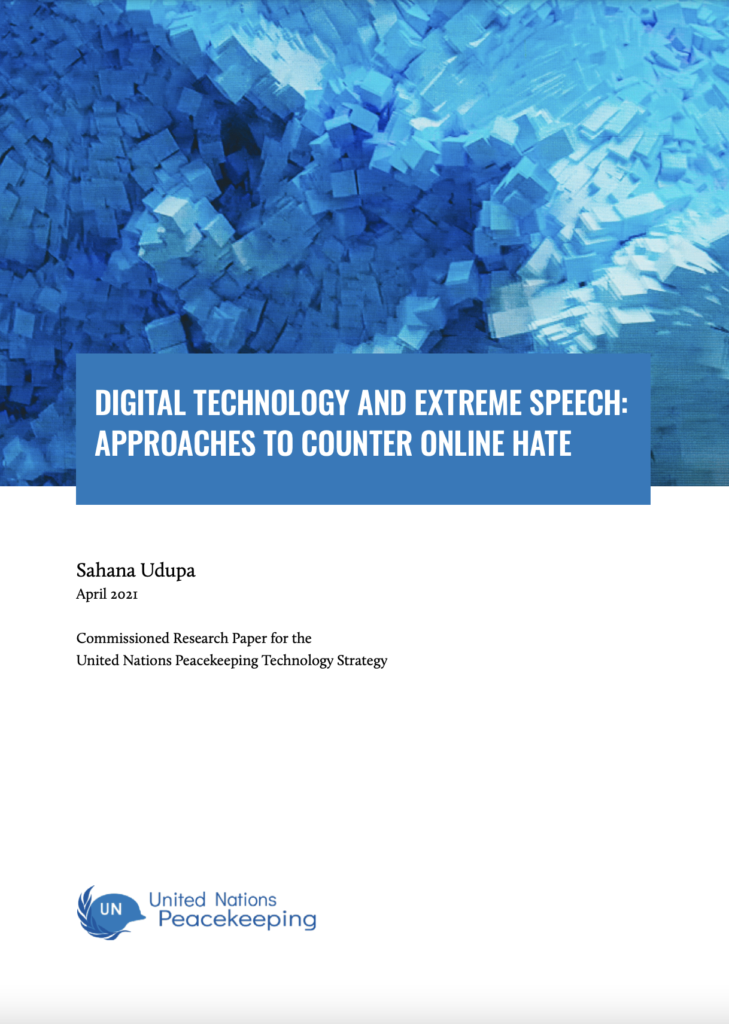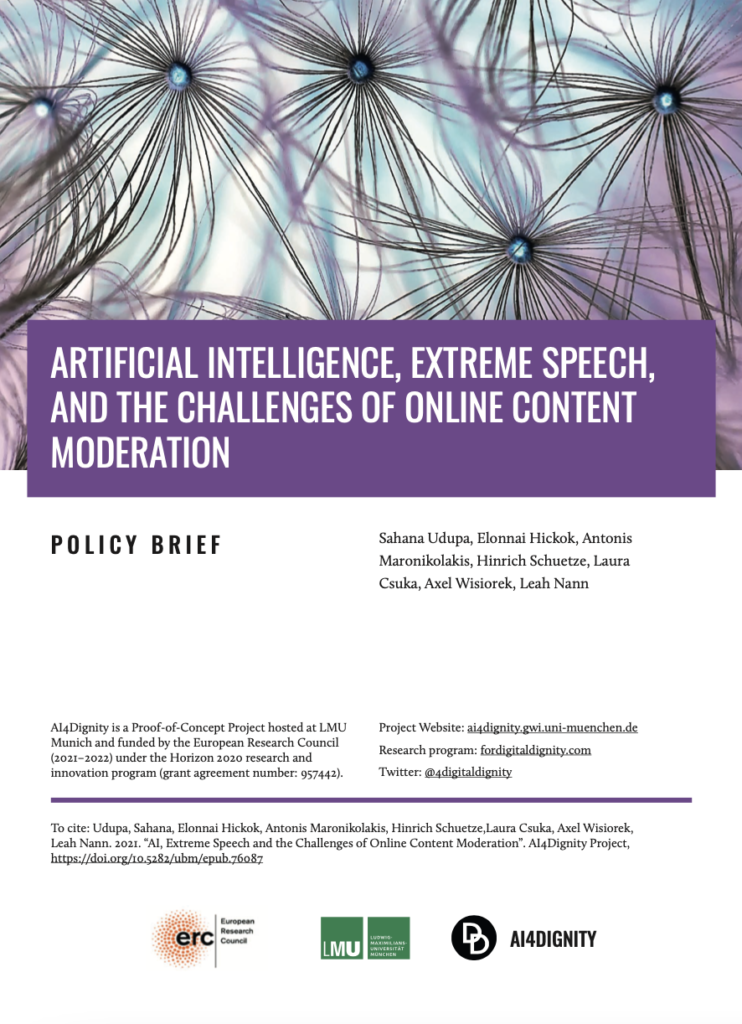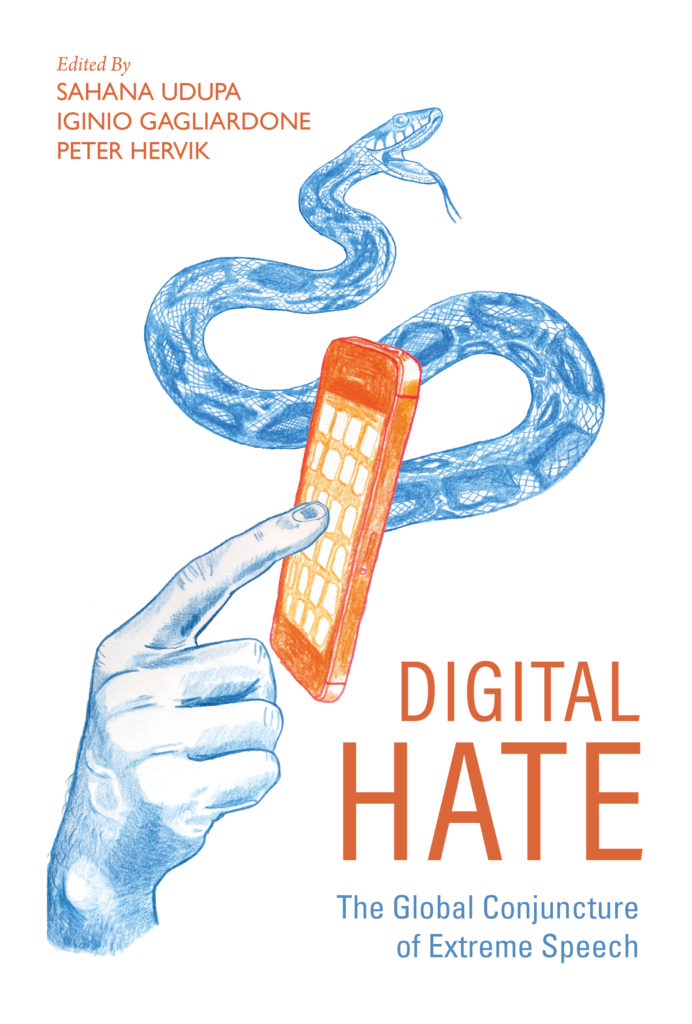academic publications
In this article published by Big Data & Society, we present new empirical evidence to demonstrate the severe limitations of existing machine learning content moderation methods to keep pace with, let alone stay ahead of, hateful language online. Presenting a decolonial critique of the “human vs machine” conundrum and drawing attention to the structuring effects of coloniality on extreme speech, we propose “ethical scaling” to highlight moderation process as political praxis.
New monograph published by New York University Press: Digital Unsettling is a critical exploration of digitalization that puts contemporary “decolonizing” movements into conversation with theorizations of digital communication. Sahana Udupa and Ethiraj Gabriel Dattatreyan interrogate the forms, forces, and processes that have reinforced neocolonial relations within contemporary digital environments, at a time when digital networks—and the agendas and actions they proffer—have unsettled entrenched hierarchies in unforeseen ways.
Presenting a multiyear ethnographic analysis of social media cultures and religious politics in India and the diaspora, this article theoretically positions the Internet enabled media as an arena of “multiple interfaces.” It signals contiguities and collisions that digital practice has opened up among the very real communities and structures of authority, under conditions shaped by longer colonial histories. The article is open access.
Exploring the nexus between between state and corporate complicity in enabling identity-based misogyny, this article proposes “counter-archiving” as a form of feminist resistance. By approaching the state itself and inscribing their agency as source, protesting women create counter-archives.
In this paper, we present new empirical evidence to demonstrate the near impossibility for existing machine learning content moderation methods to keep pace with, let alone stay ahead of, hateful language online. We diagnose the technical shortcomings of the content moderation and natural language processing approach as emerging from a broader epistemological trapping wrapped in the liberal-modern idea of the ‘human’. We provide the details of the ambiguities and complexities of annotating text as derogatory or dangerous, in a way to demonstrate the need for persistently involving communities in the process.
This chapter explores one such transnational digital congregation that emerged in the latter half of 2019 but faded in the wake of the COVID-19 pandemic in 2020. In 2016, the Citizenship Amendment Bill (CAB) was introduced by the BJP government as an act of amendment to the earlier 1955 Citizenship Act of India. In a January 2020 post on the Facebook page “German Indians Support CAA,” the Citizenship Amendment Act was called the “Citizenship Modification Act,” reiterating the “Modi” mania. The Indian diasporas’ online networks of CAA support and dissent in Germany indicate a spatiotemporal and material shift in the site of citizenship practices.
The United Nations Department for Peace Operations published a commissioned research paper on “digital technology and extreme speech” authored by Sahana Udupa as part of the DPO digital transformation strategy. Covering a vast range of cases around the world, the paper offers an analysis of extreme speech across platform regulation, user cultures and state controls, and recommends measures to tackle it at the global, national and local community levels. The paper can be downloaded here.
Online extreme speech has emerged as a significant challenge for democratic societies worldwide. Governments, companies, and academic researchers have responded to this phenomenon by increasingly turning to Artificial Intelligence (AI) as a potential tool that can detect, decelerate, and remove online extreme speech. In this policy brief, we will outline the challenges facing AI-assisted content moderation efforts, and how the collaborative coding framework proposed by the ERC Proof-of-Concept project “AI4Dignity” offers a way to address some of the pertinent issues concerning AI deployment for content moderation.
This open access book published by the Indiana University Press brings together leading anthropologists and communication scholars to offer a much needed global critical perspective on vitriolic exchange and aggressive speech enabled by the Internet. Drawing on cutting-edge case studies from around the world—from China, India, Philippines, Denmark and Kenya to Chile, Turkey, US, Pakistan and Indonesia, the book investigates online extreme speech with a global approach nuanced by ethnography and field-based research. Contributors: David Boromisza-Habashi, Gabriele de Seta, Sal Hagen, Nell Haynes, Jonas Kaiser, David Katiambo, Max Kramer, Amy Mack, Carol Mcgranahan, Jonathan Corpus Ong, Indah Pratidina, Erkan Saka, Juergen Schaflechner, Mark Tuters.

KRAMER, M. (2021) PLURAL MEDIA ETHICS? REFORMIST ISLAM IN INDIA AND THE LIMITS OF GLOBAL MEDIA ETHICS
The transatlantic academic field of global media ethics is premised on a search for the conceptual foundations of plurality. This article is a critique of this very endeavor. Kramer offers this critique through an analysis of works authored by moral anthropologists of Islam and through a close reading of the Urdu text “Cyberistan: Muslim Naujavan Aur Social Media” (Cyberistan: Muslim Youth and Social Media) authored by Sadatullah Husaini, the current president of the Indian reformist Islamic organization Jamaat e Islami Hind.
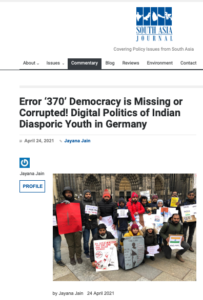
JAIN, J. (2021) ERROR '370': DEMOCRACY IS MISSING OR CORRUPTED! DIGITIAL POLITICS OF INDIAN DIASPORIC YOUTH IN GERMANY
In her study of the Indian diaspora in Germany, Jayana Jain shows how their digital engagements reveal affective intricacies that have shaped and are shaped by the dominant Hindutva discourse on nation, nationalism, citizenship, and belonging. The article reflects on how social media discourses led by young Indian diaspora and migrants are navigating the changing nationalistic imaginaries and Hindutva agendas of the BJP-led government in India, along with the Islamophobic and anti-immigrant sentiment prevalent across the globe.
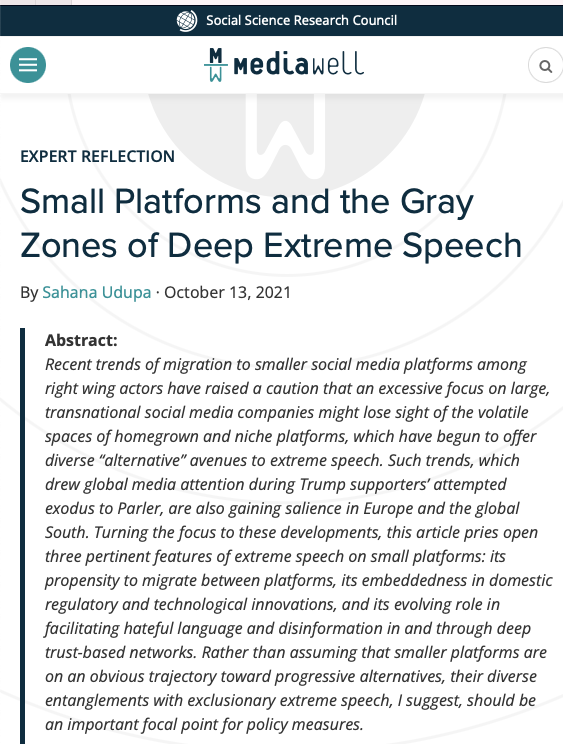
Recent trends of migration to smaller social media platforms among right wing actors have raised a caution that an excessive focus on large, transnational social media companies might lose sight of the volatile spaces of homegrown and niche platforms, which have begun to offer diverse “alternative” avenues to extreme speech. This article pries open three pertinent features of extreme speech on small platforms: its propensity to migrate between platforms, its embeddedness in domestic regulatory and technological innovations, and its evolving role in facilitating hateful language and disinformation in and through deep trust-based networks.
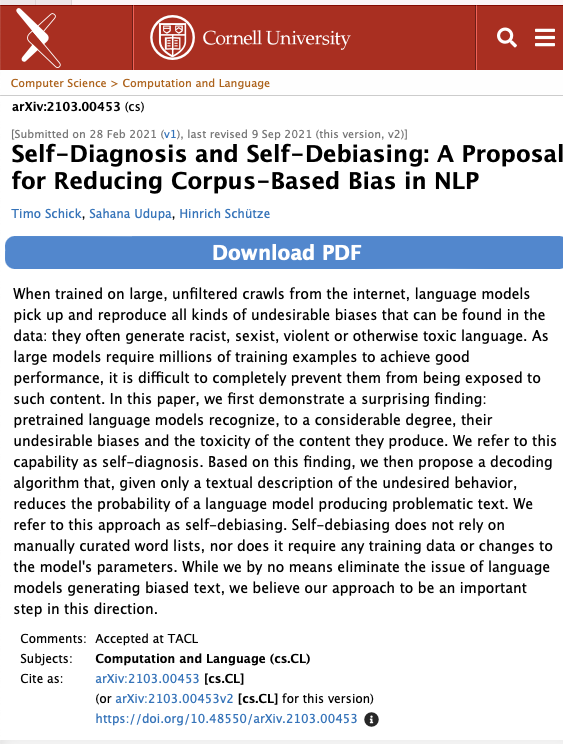
When trained on large, unfiltered crawls from the internet, language models pick up and reproduce all kinds of undesirable biases that can be found in the data: they often generate racist, sexist, violent or otherwise toxic language. As large models require millions of training examples to achieve good performance, it is difficult to completely prevent them from being exposed to such content. In this paper, we first demonstrate a surprising finding: pretrained language models recognize, to a considerable degree, their undesirable biases and the toxicity of the content they produce. We refer to this capability as self-diagnosis.
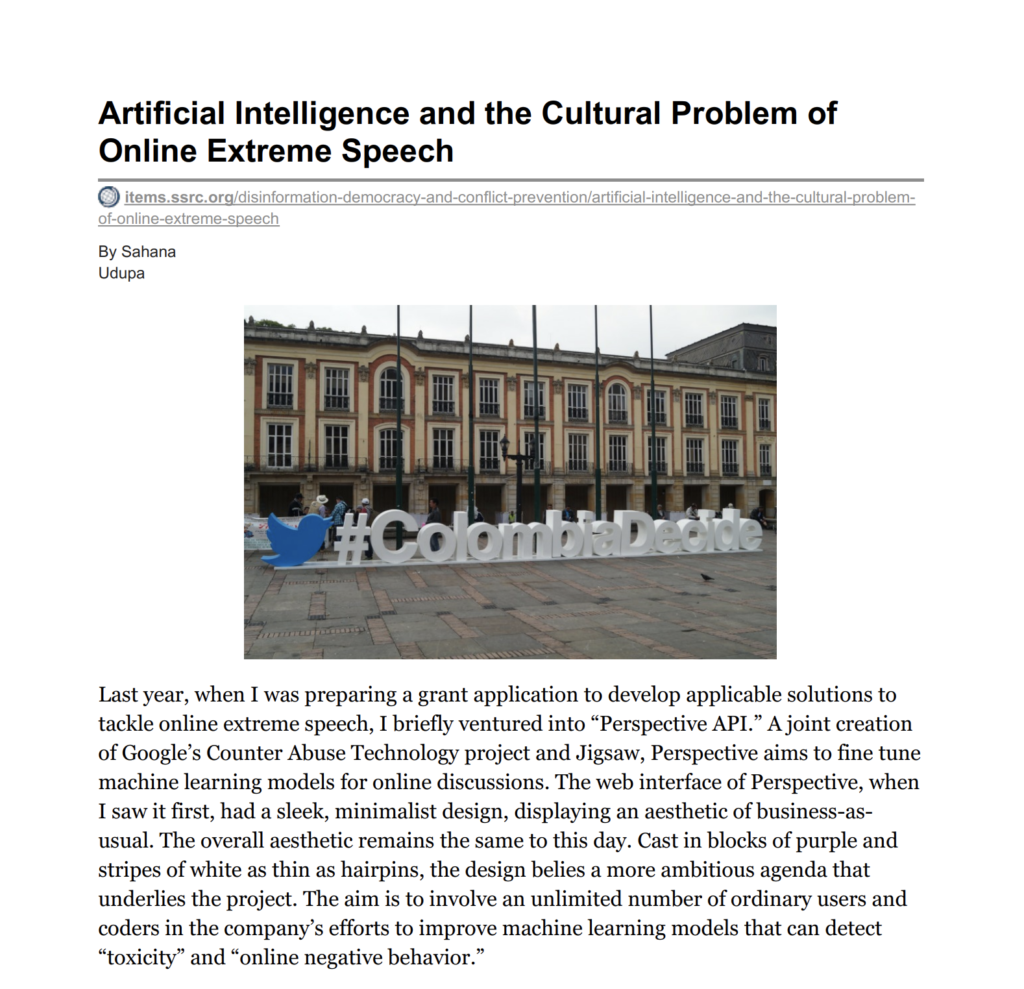
UDUPA, S. (2020) ARTIFICIAL INTELLIGENCE AND THE CULTURAL PROBLEM OF ONLINE EXTREME SPEECH.
A short foray into an AI-based platform’s effort to tackle hate speech reveals its promise, but also the enormous inherent challenges of language and context. Debunking the “magic wand” vision of AI moderation, Sahana Udupa calls for a collaborative approach between developers and critical communities.
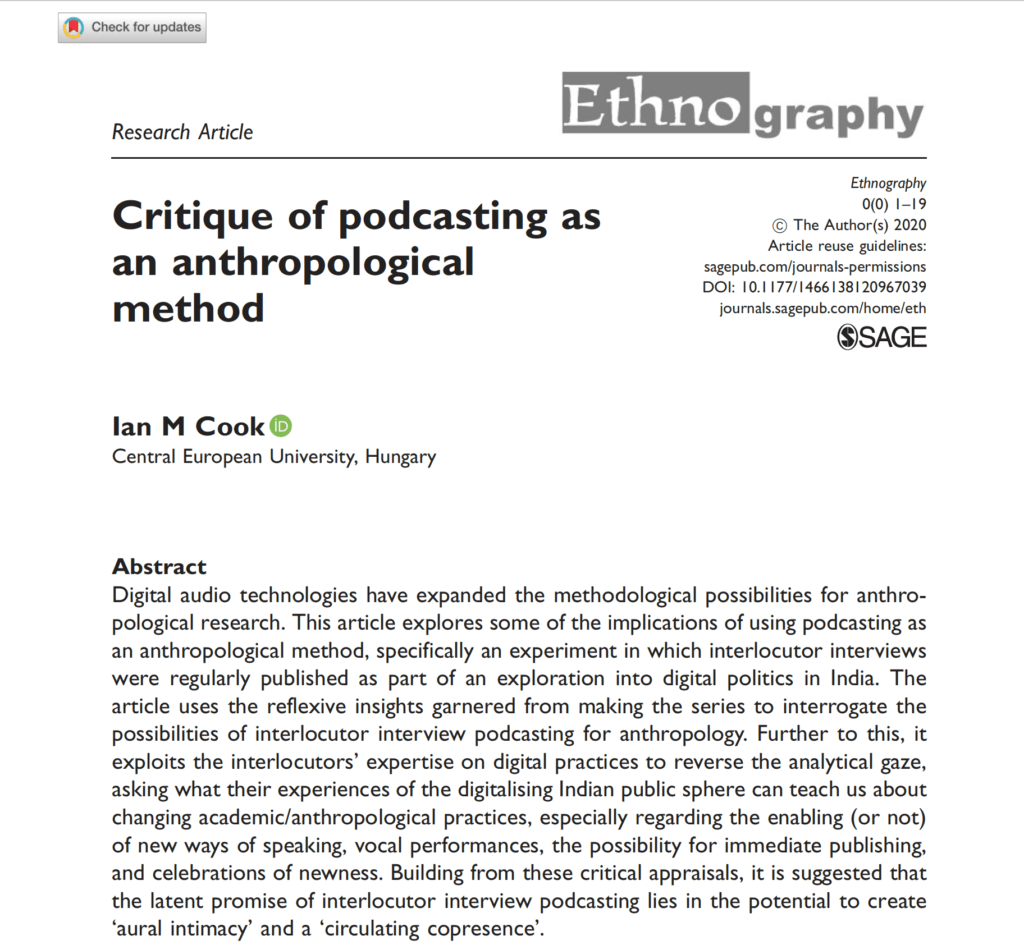
COOK, I. M. (2020) CRITIQUE OF PODCASTING AS AN ANTHROPOLOGICAL METHOD.
Digital audio technologies have expanded the methodological possibilities for anthropological research. This article explores some of the implications of using podcasting as an anthropological method, specifically an experiment in which interlocutor interviews were regularly published as part of an exploration into digital politics in India. Building from these critical appraisals, it is suggested that the latent promise of interlocutor interview podcasting lies in the potential to create ‘aural intimacy’ and a ‘circulating copresence’.

UDUPA, S. (2020) DECOLONIALITY AND EXTREME SPEECH.
This paper offers preliminary arguments for a decolonial critique of vitriol and disinformation circulating on online media—a phenomenon that has raised moral panic among liberal minded critics. The decolonial critique developed here probes the roots of this moral panic and considers the limits of analysis arising out of such a panic. Rather than viewing this moral panic as an expected reaction to a crisis produced by digital communication, I emphasize the need for historical sensibility and argue that information disorder and hate speech are part of the global process of racialized colonialism that is now increasingly funneling affective infrastructures of the digital.
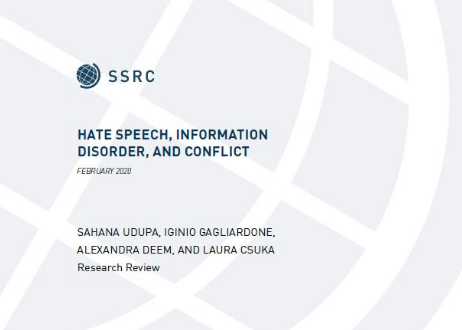
UDUPA, S., GAGLIARDONE I., DEEM, A. & CSUKA L. (2020) FIELD OF DISINFORMATION, DEMOCRATIC PROCESSES, AND CONFLICT PREVENTION: A SCAN OF THE LITERATURE.
This literature review is concerned with the intersection of hateful speech, information disorder, and conflict. Academic inquiries on hate speech and information disorder can be approached both as part of a long-term history of researching enablers and triggers of conflict and violence, and as more recent attempts to explain vitriolic and dehumanizing language and imagery powered by the spread of online communication. From a methodological standpoint, the relative ease of accessing and following what is being said has also tilted research toward mapping how expressions of hatred and disinformation arise and travel, rather than explaining why they emerge and what consequences they may have beyond the spaces where they occur.
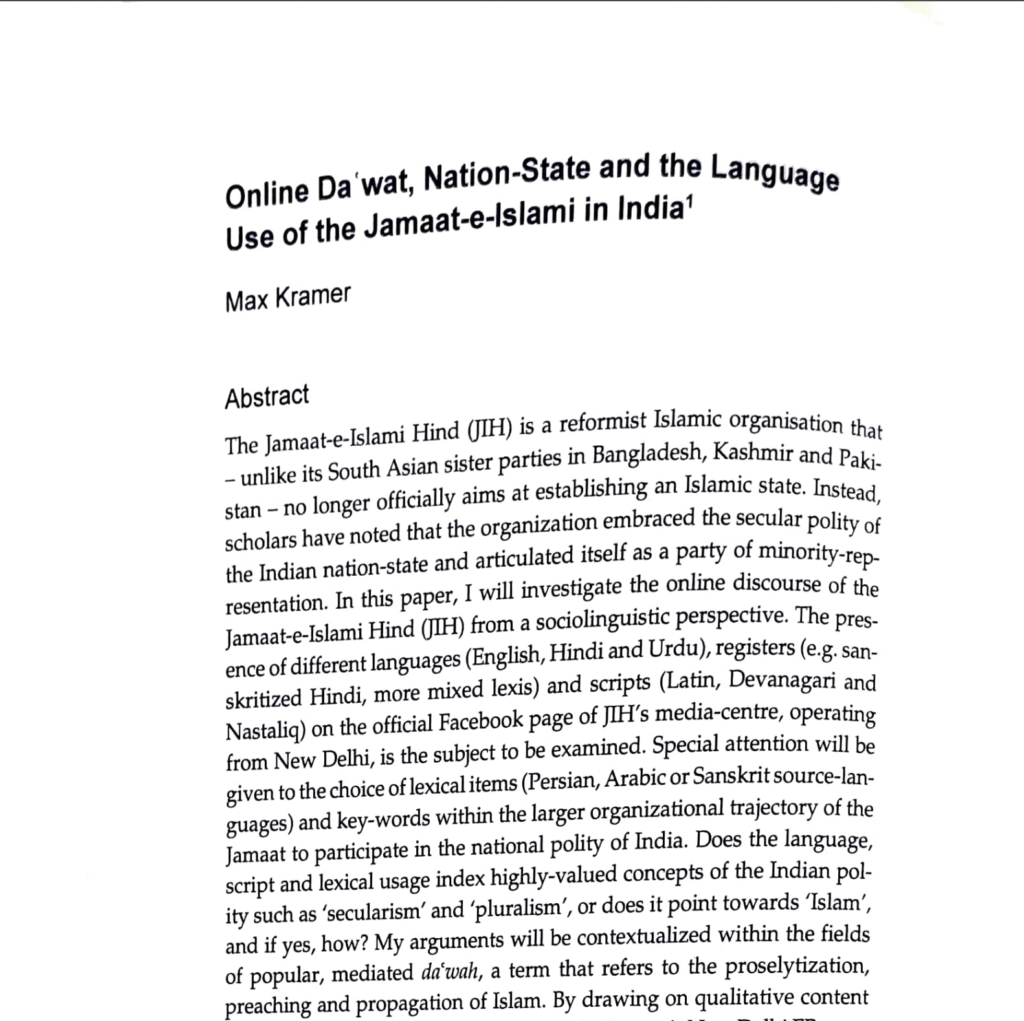
The Jamaat-e-Islami Hind (JIH) is a reformist Islamic organisation that – unlike its South Asian sister parties – no longer officially aims at establishing an Islamic state. This paper investigates the online discourse Jamaat-e-Islami Hind (JIH) from a sociolinguistic perspective.
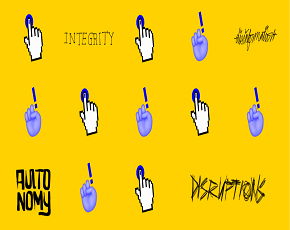
UDUPA, S. (2019) DIGITAL DISINFORMATION AND ELECTION INTEGRITY: BENCHMARKS FOR REGULATION.
This article outlines some of the regulatory challenges that have emerged in the wake of digital media expansion in India, and argues that the self-regulatory mechanism that was developed during the 2019 national elections is insufficient in addressing problems of online extreme speech, algorithmic bias, and proxy campaigns. Building on the electoral management model proposed by Netina Tan, it suggests that a critical overview of ongoing efforts can help determine the readiness of Indian regulatory structures to respond to digital disruptions during elections and emphasises the need for a co-regulatory mechanism.

UDUPA, S., & POHJONEN, M. (2019) SPECIAL JOURNAL SECTION: EXTREME SPEECH AND GLOBAL DIGITAL MEDIA CULTURES.
In this article, we introduce the Special Section on Extreme Speech and Global Digital Cultures by developing the concept of “extreme speech.” In addressing the growing cultures of online vitriol and extremism, this concept advances a critical ethnographic sensibility to situated online speech cultures and a comparative global conversation that moves beyond the legal-normative debates that have been dominant in North America and Europe.
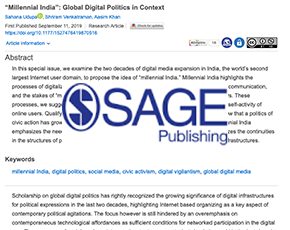
UDUPA, S., VENKATRAMAN, S. & KHAN, A. (2019) SPECIAL JOURNAL ISSUE: DIGITAL POLITICS IN MILLENNIAL INDIA.
What have digital media done to political participations in India – the world’s second largest region of Internet users? Bringing together latest works that shed light on facets of digital politics – from labor activism and Dalit mobilization to diaspora nationalism and caste-based vigilantism – this special issue develops the framework of “Millennial India” and shows how a politics of civic action has grown simultaneously with violent exclusions via digital circulation.
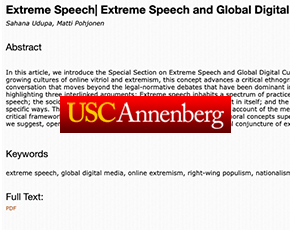
UDUPA, S., & POHJONEN, M. (2019) EXTREME SPEECH AND GLOBAL DIGITAL CULTURES.
In this article, we introduce the Special Section on Extreme Speech and Global Digital Cultures by developing the concept of “extreme speech.” In addressing the growing cultures of online vitriol and extremism, this concept advances a critical ethnographic sensibility to situated online speech cultures and a comparative global conversation that moves beyond the legal-normative debates that have been dominant in North America and Europe.
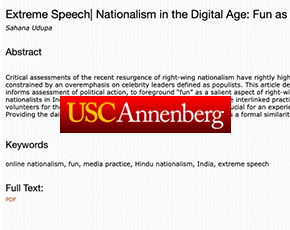
UDUPA, S. (2019) NATIONALISM IN THE DIGITAL AGE: FUN AS A METAPRACTICE OF EXTREME SPEECH.
Critical assessments of the recent resurgence of right-wing nationalism have rightly highlighted the role of social media in these troubling times, yet they are constrained by an overemphasis on celebrity leaders defined as populists. This article departs from a leader-centric analysis and the liberal frame that still largely informs assessment of political action, to foreground “fun” as a salient aspect of right-wing mobilization. Building on ethnographic fieldwork among the Hindu nationalists in India, it argues that fun is a metapractice that shapes the interlinked practices of fact-checking, abuse, assembly, and aggression among online volunteers for the right-wing movement.

UDUPA, S., VENKATRAMAN, S. & KHAN, A. (2019) ”MILLENNIAL INDIA”: GLOBAL DIGITAL POLITICS IN CONTEXT.
In this special issue, we examine the two decades of digital media expansion in India, the world’s second largest Internet user domain, to propose the idea of “millennial India.” Millennial India highlights the processes of digitalization as a distinct sociopolitical moment entailing new conditions of communication, and the stakes of “millennials” who are drawn to digital media to articulate political matters.
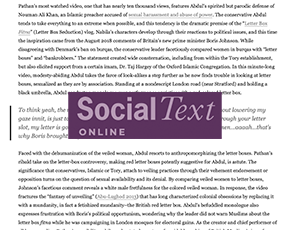
SIDDIQUE, S. (2019) THE MUSLIM MATROYSHKA: VLOGGING IMMIGRATION AND CITIZENSHIP IN BREXIT BRITAIN.
The British Indian Muslim reminds one of a Matryoshka assembly, a nesting of several closely related, yet discrete, wholes. The category, on the one hand, invokes the history of South Asian Muslims under the British crown from 1858 until 1947. On the other, it is associated with India as the pivotal port of departure of South Asian postcolonial migration, alongside East Africa, Pakistan, Sri Lanka, and Bangladesh. Here the Indian Muslim could well be the innermost, as diminutive and hidden. It is in the temporal relay and political shifts represented by the innermost and the outermost shell of the Matryoshka that I propose the exceptionalism of the British Indian Muslim.
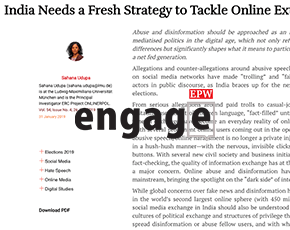
UDUPA, S. (2019) INDIA NEEDS A FRESH STRATEGY TO TACKLE ONLINE EXTREME SPEECH.
Abuse and disinformation should be approached as an important culture of mediatised politics in the digital age, which not only reflects extant political differences but significantly shapes what it means to participate in public life for a net fed generation. Allegations and counter-allegations around abusive speech and disinformation on social media networks have made “trolling” and “fake news” significant actors in public discourse, as India braces up for the next round of national elections.
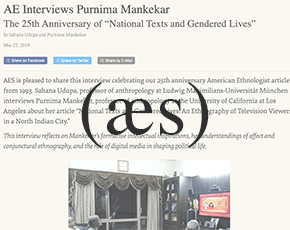
UDUPA, S. & MANKEKAR, P. (2019) AES INTERVIEWS PURNIMA MANKEKAR: THE 25TH ANNIVERSARY OF “NATIONAL TEXTS AND GENDERED LIVES”’.
Sahana Udupa, professor of anthropology at Ludwig Maximilians-Universität München interviews Purnima Mankekar, professor of anthropology at the University of California at Los Angeles about her article “National Texts and Gendered Lives: An Ethnography of Television Viewers in a North Indian City.” This interview reflects on Mankekar’s formative intellectual inspirations, her understandings of affect and conjunctural ethnography, and the role of digital media in shaping political life.
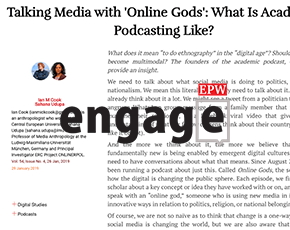
COOK, I. M. & UDUPA. S. (2019) TALKING MEDIA WITH ‘ONLINE GODS’: WHAT IS ACADEMIC PODCASTING LIKE?”.
What does it mean “to do ethnography” in the “digital age”? Should ethnography become multimodal? The founders of the academic podcast, Online Gods, provide an insight.
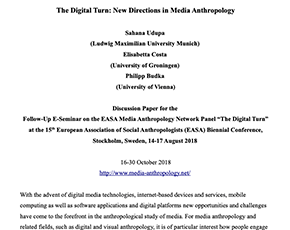
UDUPA, S., COSTA, E. & BUDKA, P. (2018) THE DIGITAL TURN: NEW DIRECTIONS IN MEDIA ANTHROPOLOGY. 63RD EASA MEDIA ANTHROPOLOGY E-SEMINAR, EUROPEAN ASSOCIATION OF SOCIAL ANTHROPOLOGISTS.
With the advent of digital media technologies, internet-based devices and services, mobile computing as well as software applications and digital platforms new opportunities and challenges have come to the forefront in the anthropological study of media.
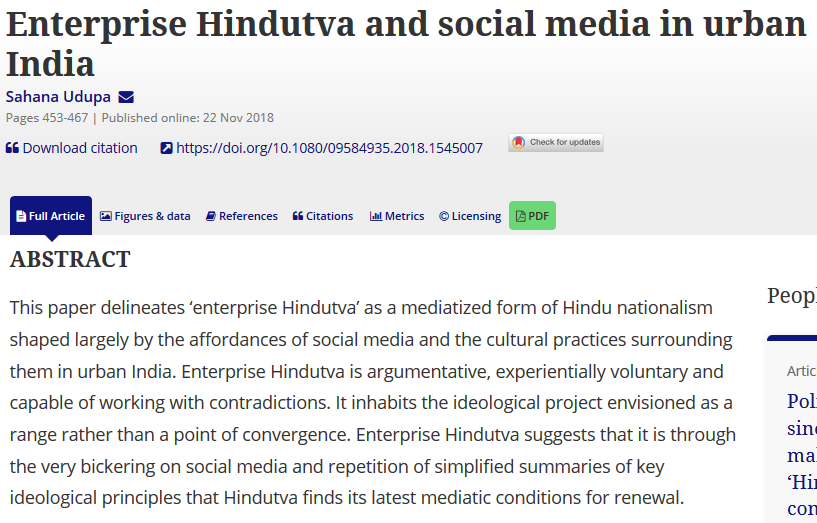
UDUPA, S. (2018) ENTERPRISE HINDUTVA AND SOCIAL MEDIA IN URBAN INDIA.
This paper delineates ‘enterprise Hindutva’ as a mediatized form of Hindu nationalism shaped largely by the affordances of social media and the cultural practices surrounding them in urban India. Enterprise Hindutva is argumentative, experientially voluntary and capable of working with contradictions. It inhabits the ideological project envisioned as a range rather than a point of convergence. Enterprise Hindutva suggests that it is through the very bickering on social media and repetition of simplified summaries of key ideological principles that Hindutva finds its latest mediatic conditions for renewal.
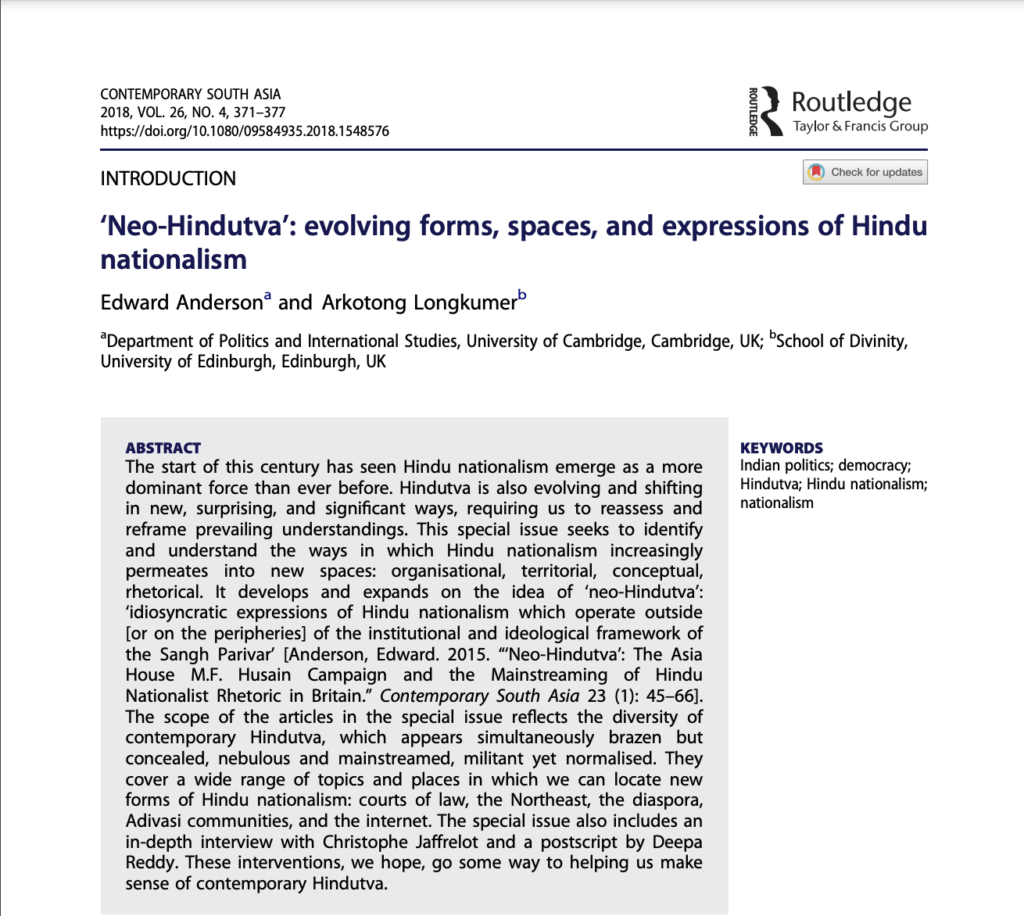
ANDERSON, E., LONGKUMER, A. (2018) "NEO-HINDUTVA”: EVOLVING FORMS, SPACES, AND EXPRESSIONS OF HINDU NATIONALISM.
This special issue seeks to identify and understand the ways in which Hindu nationalism increasingly permeates into new spaces: organisational, territorial, conceptual, rhetorical. It develops and expands on the idea of ‘neo-Hindutva’: ‘idiosyncratic expressions of Hindu nationalism which operate outside [or on the peripheries] of the institutional and ideological framework of the Sangh Parivar’.
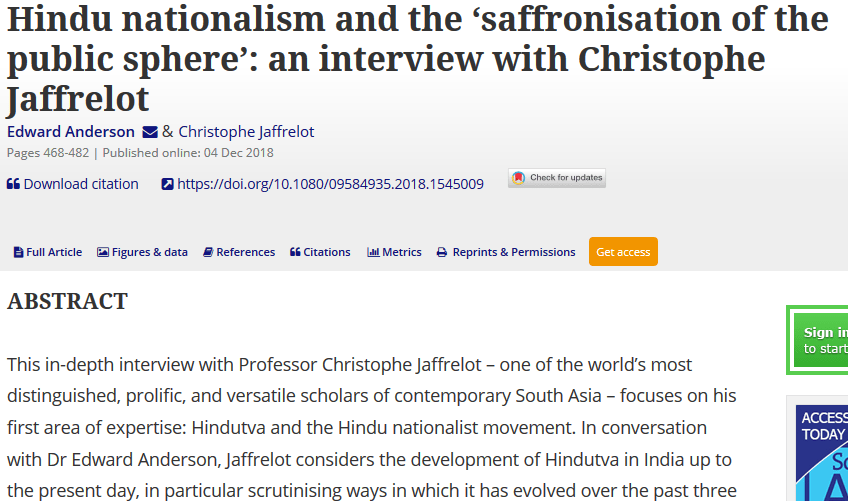
ANDERSON, E., JAFFRELOT, C. (2018) HINDU NATIONALISM AND THE ‘SAFFRONIZATION OF THE PUBLIC SPHERE’ INTERVIEW WITH CHRISTOPHE JAFFRELOT.
This in-depth interview with Professor Christophe Jaffrelot – one of the world’s most distinguished, prolific, and versatile scholars of contemporary South Asia – focuses on his first area of expertise: Hindutva and the Hindu nationalist movement. In conversation with Dr Edward Anderson, Jaffrelot considers the development of Hindutva in India up to the present day, in particular scrutinising ways in which it has evolved over the past three decades.
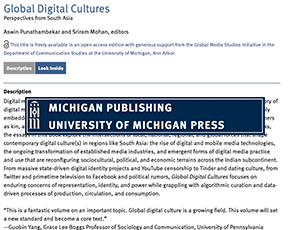
UDUPA, S. (2018) CLASH OF ACTORS: NEW MEDIA AND MIDDLE CLASS POLITICS ON ONLINE MEDIA.
If neonationalism has emerged as an isolationist response to global and regional migration in the Global North, digital media in India reveal a complex landscape of warring narratives and divergent claims, which has fueled, with all its contradictions, a rambunctious discourse around nation and national belonging. Neither reducible to exclusivist populism nor to “benign” patriotism, digitally mediated national imaginaries reveal a zone of confrontation among the middle classes in urban India. Based on ongoing ethnographic fieldwork among online users in Mumbai, Bangalore, and Delhi, and a close reading of tweets around the hashtag “ModiInsultsIndia” on the microblogging platform Twitter, I delineate this zone of confrontation with two interlinked observations.

UDUPA, S. (2017) GAALI CULTURES: THE POLITICS OF ABUSIVE EXCHANGE ON SOCIAL MEDIA.
This article draws upon anthropology of insult to uncover the distinctness, if at all, of online abuse as a means for political participation as well as for the encumbering it provokes and relations of domination it reproduces as a result. In so doing, the article critiques the conception of ludic as anti-hegemonic in the Bakhtin tradition, and develops an emic term “gaali” to signal the blurred boundaries between comedy, insult, shame, and abuse emerging on online media, which also incite gendered forms of intimidation. Gaali, it argues, is best conceptualized through the metaphor of “sound” as distinct from what recent new media studies theorize as “voice.”
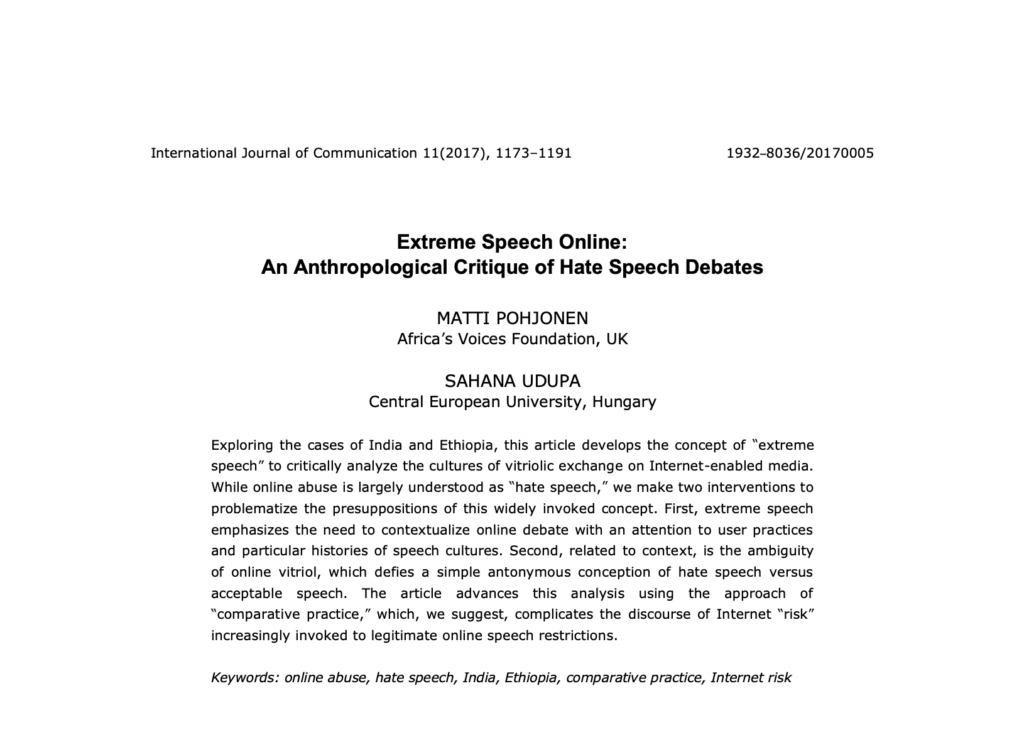
POHJONEN, M & UDUPA, S. (2017) EXTREME SPEECH ONLINE: AN ANTHROPOLOGICAL CRITIQUE OF HATE SPEECH DEBATES.
Exploring the cases of India and Ethiopia, this article develops the concept of “extreme speech” to critically analyze the cultures of vitriolic exchange on Internet-enabled media. While online abuse is largely understood as “hate speech,” we make two interventions to problematize the presuppositions of this widely invoked concept. First, extreme speech emphasizes the need to contextualize online debate with an attention to user practices and particular histories of speech cultures. Second, related to context, is the ambiguity of online vitriol, which defies a simple antonymous conception of hate speech versus acceptable speech.

UDUPA, S. (2016) FAST TIME RELIGION: NEWS, SPECULATION, AND DISCIPLINE IN INDIA.
This article takes the expanding religious programs on private news television in India, and Bangalore city in particular, as a lens to explore new intersections between media and Hindu religiosities, and the conditions that facilitate synergies between religious enterprise, media creativity, and economic mediation in a liberalizing era.
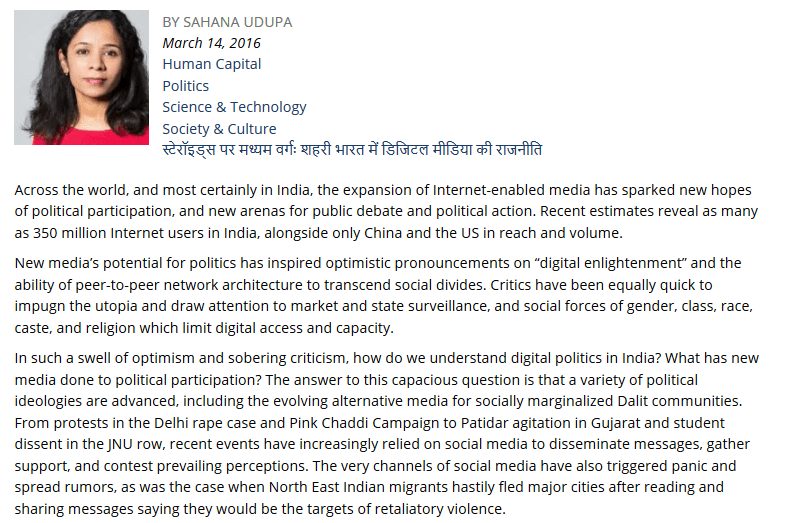
UDUPA, S. (2016) MIDDLE CLASS ON STEROIDS: DIGITAL MEDIA POLITICS IN URBAN INDIA.
New media’s potential for politics has inspired optimistic pronouncements on “digital enlightenment” and the ability of peer-to-peer network architecture to transcend social divides. Critics have been equally quick to impugn the utopia and draw attention to market and state surveillance, and social forces of gender, class, race, caste, and religion which limit digital access and capacity. In such a swell of optimism and sobering criticism, how do we understand digital politics in India?
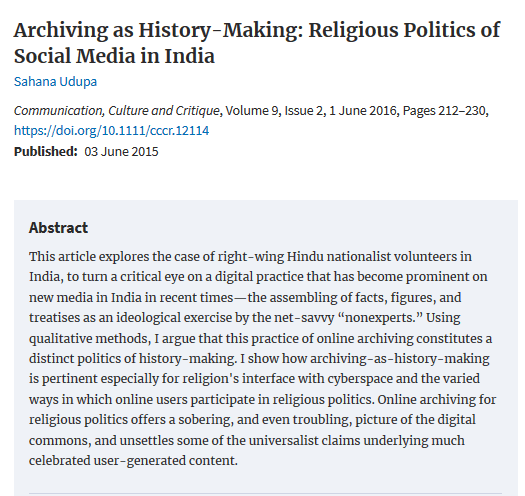
UDUPA, S. (2015) ARCHIVING AS HISTORY–MAKING: RELIGIOUS POLITICS OF SOCIAL MEDIA IN INDIA.
This article explores the case of right-wing Hindu nationalist volunteers in India, to turn a critical eye on a digital practice that has become prominent on new media in India in recent times—the assembling of facts, figures, and treatises as an ideological exercise by the net-savvy “nonexperts.”
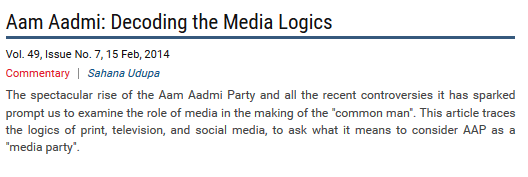
UDUPA, S. (2014) AAM AADMI: DECODING THE MEDIA LOGICS.
The spectacular rise of the Aam Aadmi Party and all the recent controversies it has sparked prompt us to examine the role of media in the making of the “common man”. This article traces the logics of print, television, and social media, to ask what it means to consider AAP as a “media party”.
Presenting a multiyear ethnographic analysis of social media cultures and religious politics in India and the diaspora, this article theoretically positions the Internet enabled media as an arena of “multiple interfaces.” It signals contiguities and collisions that digital practice has opened up among the very real communities and structures of authority, under conditions shaped by longer colonial histories. The article is open access.
In this paper, we present new empirical evidence to demonstrate the near impossibility for existing machine learning content moderation methods to keep pace with, let alone stay ahead of, hateful language online. We diagnose the technical shortcomings of the content moderation and natural language processing approach as emerging from a broader epistemological trapping wrapped in the liberal-modern idea of the ‘human’. We provide the details of the ambiguities and complexities of annotating text as derogatory or dangerous, in a way to demonstrate the need for persistently involving communities in the process.
This chapter explores one such transnational digital congregation that emerged in the latter half of 2019 but faded in the wake of the COVID-19 pandemic in 2020. In 2016, the Citizenship Amendment Bill (CAB) was introduced by the BJP government as an act of amendment to the earlier 1955 Citizenship Act of India. In a January 2020 post on the Facebook page “German Indians Support CAA,” the Citizenship Amendment Act was called the “Citizenship Modification Act,” reiterating the “Modi” mania. The Indian diasporas’ online networks of CAA support and dissent in Germany indicate a spatiotemporal and material shift in the site of citizenship practices.
The United Nations Department for Peace Operations published a commissioned research paper on “digital technology and extreme speech” authored by Sahana Udupa as part of the DPO digital transformation strategy. Covering a vast range of cases around the world, the paper offers an analysis of extreme speech across platform regulation, user cultures and state controls, and recommends measures to tackle it at the global, national and local community levels. The paper can be downloaded here.
Online extreme speech has emerged as a significant challenge for democratic societies worldwide. Governments, companies, and academic researchers have responded to this phenomenon by increasingly turning to Artificial Intelligence (AI) as a potential tool that can detect, decelerate, and remove online extreme speech. In this policy brief, we will outline the challenges facing AI-assisted content moderation efforts, and how the collaborative coding framework proposed by the ERC Proof-of-Concept project “AI4Dignity” offers a way to address some of the pertinent issues concerning AI deployment for content moderation.
This open access book published by the Indiana University Press brings together leading anthropologists and communication scholars to offer a much needed global critical perspective on vitriolic exchange and aggressive speech enabled by the Internet. Drawing on cutting-edge case studies from around the world—from China, India, Philippines, Denmark and Kenya to Chile, Turkey, US, Pakistan and Indonesia, the book investigates online extreme speech with a global approach nuanced by ethnography and field-based research. Contributors: David Boromisza-Habashi, Gabriele de Seta, Sal Hagen, Nell Haynes, Jonas Kaiser, David Katiambo, Max Kramer, Amy Mack, Carol Mcgranahan, Jonathan Corpus Ong, Indah Pratidina, Erkan Saka, Juergen Schaflechner, Mark Tuters.

KRAMER, M. (2021) PLURAL MEDIA ETHICS? REFORMIST ISLAM IN INDIA AND THE LIMITS OF GLOBAL MEDIA ETHICS
The transatlantic academic field of global media ethics is premised on a search for the conceptual foundations of plurality. This article is a critique of this very endeavor. Kramer offers this critique through an analysis of works authored by moral anthropologists of Islam and through a close reading of the Urdu text “Cyberistan: Muslim Naujavan Aur Social Media” (Cyberistan: Muslim Youth and Social Media) authored by Sadatullah Husaini, the current president of the Indian reformist Islamic organization Jamaat e Islami Hind.

JAIN, J. (2021) ERROR '370': DEMOCRACY IS MISSING OR CORRUPTED! DIGITIAL POLITICS OF INDIAN DIASPORIC YOUTH IN GERMANY
In her study of the Indian diaspora in Germany, Jayana Jain shows how their digital engagements reveal affective intricacies that have shaped and are shaped by the dominant Hindutva discourse on nation, nationalism, citizenship, and belonging. The article reflects on how social media discourses led by young Indian diaspora and migrants are navigating the changing nationalistic imaginaries and Hindutva agendas of the BJP-led government in India, along with the Islamophobic and anti-immigrant sentiment prevalent across the globe.

Recent trends of migration to smaller social media platforms among right wing actors have raised a caution that an excessive focus on large, transnational social media companies might lose sight of the volatile spaces of homegrown and niche platforms, which have begun to offer diverse “alternative” avenues to extreme speech. This article pries open three pertinent features of extreme speech on small platforms: its propensity to migrate between platforms, its embeddedness in domestic regulatory and technological innovations, and its evolving role in facilitating hateful language and disinformation in and through deep trust-based networks.

When trained on large, unfiltered crawls from the internet, language models pick up and reproduce all kinds of undesirable biases that can be found in the data: they often generate racist, sexist, violent or otherwise toxic language. As large models require millions of training examples to achieve good performance, it is difficult to completely prevent them from being exposed to such content. In this paper, we first demonstrate a surprising finding: pretrained language models recognize, to a considerable degree, their undesirable biases and the toxicity of the content they produce. We refer to this capability as self-diagnosis.

UDUPA, S. (2020) ARTIFICIAL INTELLIGENCE AND THE CULTURAL PROBLEM OF ONLINE EXTREME SPEECH.
A short foray into an AI-based platform’s effort to tackle hate speech reveals its promise, but also the enormous inherent challenges of language and context. Debunking the “magic wand” vision of AI moderation, Sahana Udupa calls for a collaborative approach between developers and critical communities.

COOK, I. M. (2020) CRITIQUE OF PODCASTING AS AN ANTHROPOLOGICAL METHOD.
Digital audio technologies have expanded the methodological possibilities for anthropological research. This article explores some of the implications of using podcasting as an anthropological method, specifically an experiment in which interlocutor interviews were regularly published as part of an exploration into digital politics in India. Building from these critical appraisals, it is suggested that the latent promise of interlocutor interview podcasting lies in the potential to create ‘aural intimacy’ and a ‘circulating copresence’.

UDUPA, S. (2020) DECOLONIALITY AND EXTREME SPEECH.
This paper offers preliminary arguments for a decolonial critique of vitriol and disinformation circulating on online media—a phenomenon that has raised moral panic among liberal minded critics. The decolonial critique developed here probes the roots of this moral panic and considers the limits of analysis arising out of such a panic. Rather than viewing this moral panic as an expected reaction to a crisis produced by digital communication, I emphasize the need for historical sensibility and argue that information disorder and hate speech are part of the global process of racialized colonialism that is now increasingly funneling affective infrastructures of the digital.

UDUPA, S., GAGLIARDONE I., DEEM, A. & CSUKA L. (2020) FIELD OF DISINFORMATION, DEMOCRATIC PROCESSES, AND CONFLICT PREVENTION: A SCAN OF THE LITERATURE.
This literature review is concerned with the intersection of hateful speech, information disorder, and conflict. Academic inquiries on hate speech and information disorder can be approached both as part of a long-term history of researching enablers and triggers of conflict and violence, and as more recent attempts to explain vitriolic and dehumanizing language and imagery powered by the spread of online communication. From a methodological standpoint, the relative ease of accessing and following what is being said has also tilted research toward mapping how expressions of hatred and disinformation arise and travel, rather than explaining why they emerge and what consequences they may have beyond the spaces where they occur.

The Jamaat-e-Islami Hind (JIH) is a reformist Islamic organisation that – unlike its South Asian sister parties – no longer officially aims at establishing an Islamic state. This paper investigates the online discourse Jamaat-e-Islami Hind (JIH) from a sociolinguistic perspective.

UDUPA, S. (2019) DIGITAL DISINFORMATION AND ELECTION INTEGRITY: BENCHMARKS FOR REGULATION.
This article outlines some of the regulatory challenges that have emerged in the wake of digital media expansion in India, and argues that the self-regulatory mechanism that was developed during the 2019 national elections is insufficient in addressing problems of online extreme speech, algorithmic bias, and proxy campaigns. Building on the electoral management model proposed by Netina Tan, it suggests that a critical overview of ongoing efforts can help determine the readiness of Indian regulatory structures to respond to digital disruptions during elections and emphasises the need for a co-regulatory mechanism.

UDUPA, S., & POHJONEN, M. (2019) SPECIAL JOURNAL SECTION: EXTREME SPEECH AND GLOBAL DIGITAL MEDIA CULTURES.
In this article, we introduce the Special Section on Extreme Speech and Global Digital Cultures by developing the concept of “extreme speech.” In addressing the growing cultures of online vitriol and extremism, this concept advances a critical ethnographic sensibility to situated online speech cultures and a comparative global conversation that moves beyond the legal-normative debates that have been dominant in North America and Europe.

UDUPA, S., VENKATRAMAN, S. & KHAN, A. (2019) SPECIAL JOURNAL ISSUE: DIGITAL POLITICS IN MILLENNIAL INDIA.
What have digital media done to political participations in India – the world’s second largest region of Internet users? Bringing together latest works that shed light on facets of digital politics – from labor activism and Dalit mobilization to diaspora nationalism and caste-based vigilantism – this special issue develops the framework of “Millennial India” and shows how a politics of civic action has grown simultaneously with violent exclusions via digital circulation.

UDUPA, S., & POHJONEN, M. (2019) EXTREME SPEECH AND GLOBAL DIGITAL CULTURES.
In this article, we introduce the Special Section on Extreme Speech and Global Digital Cultures by developing the concept of “extreme speech.” In addressing the growing cultures of online vitriol and extremism, this concept advances a critical ethnographic sensibility to situated online speech cultures and a comparative global conversation that moves beyond the legal-normative debates that have been dominant in North America and Europe.

UDUPA, S. (2019) NATIONALISM IN THE DIGITAL AGE: FUN AS A METAPRACTICE OF EXTREME SPEECH.
Critical assessments of the recent resurgence of right-wing nationalism have rightly highlighted the role of social media in these troubling times, yet they are constrained by an overemphasis on celebrity leaders defined as populists. This article departs from a leader-centric analysis and the liberal frame that still largely informs assessment of political action, to foreground “fun” as a salient aspect of right-wing mobilization. Building on ethnographic fieldwork among the Hindu nationalists in India, it argues that fun is a metapractice that shapes the interlinked practices of fact-checking, abuse, assembly, and aggression among online volunteers for the right-wing movement.

UDUPA, S., VENKATRAMAN, S. & KHAN, A. (2019) ”MILLENNIAL INDIA”: GLOBAL DIGITAL POLITICS IN CONTEXT.
In this special issue, we examine the two decades of digital media expansion in India, the world’s second largest Internet user domain, to propose the idea of “millennial India.” Millennial India highlights the processes of digitalization as a distinct sociopolitical moment entailing new conditions of communication, and the stakes of “millennials” who are drawn to digital media to articulate political matters.

SIDDIQUE, S. (2019) THE MUSLIM MATROYSHKA: VLOGGING IMMIGRATION AND CITIZENSHIP IN BREXIT BRITAIN.
The British Indian Muslim reminds one of a Matryoshka assembly, a nesting of several closely related, yet discrete, wholes. The category, on the one hand, invokes the history of South Asian Muslims under the British crown from 1858 until 1947. On the other, it is associated with India as the pivotal port of departure of South Asian postcolonial migration, alongside East Africa, Pakistan, Sri Lanka, and Bangladesh. Here the Indian Muslim could well be the innermost, as diminutive and hidden. It is in the temporal relay and political shifts represented by the innermost and the outermost shell of the Matryoshka that I propose the exceptionalism of the British Indian Muslim.

UDUPA, S. (2019) INDIA NEEDS A FRESH STRATEGY TO TACKLE ONLINE EXTREME SPEECH.
Abuse and disinformation should be approached as an important culture of mediatised politics in the digital age, which not only reflects extant political differences but significantly shapes what it means to participate in public life for a net fed generation. Allegations and counter-allegations around abusive speech and disinformation on social media networks have made “trolling” and “fake news” significant actors in public discourse, as India braces up for the next round of national elections.

UDUPA, S. & MANKEKAR, P. (2019) AES INTERVIEWS PURNIMA MANKEKAR: THE 25TH ANNIVERSARY OF “NATIONAL TEXTS AND GENDERED LIVES”’.
Sahana Udupa, professor of anthropology at Ludwig Maximilians-Universität München interviews Purnima Mankekar, professor of anthropology at the University of California at Los Angeles about her article “National Texts and Gendered Lives: An Ethnography of Television Viewers in a North Indian City.” This interview reflects on Mankekar’s formative intellectual inspirations, her understandings of affect and conjunctural ethnography, and the role of digital media in shaping political life.

COOK, I. M. & UDUPA. S. (2019) TALKING MEDIA WITH ‘ONLINE GODS’: WHAT IS ACADEMIC PODCASTING LIKE?”.
What does it mean “to do ethnography” in the “digital age”? Should ethnography become multimodal? The founders of the academic podcast, Online Gods, provide an insight.

UDUPA, S., COSTA, E. & BUDKA, P. (2018) THE DIGITAL TURN: NEW DIRECTIONS IN MEDIA ANTHROPOLOGY. 63RD EASA MEDIA ANTHROPOLOGY E-SEMINAR, EUROPEAN ASSOCIATION OF SOCIAL ANTHROPOLOGISTS.
With the advent of digital media technologies, internet-based devices and services, mobile computing as well as software applications and digital platforms new opportunities and challenges have come to the forefront in the anthropological study of media.

UDUPA, S. (2018) ENTERPRISE HINDUTVA AND SOCIAL MEDIA IN URBAN INDIA.
This paper delineates ‘enterprise Hindutva’ as a mediatized form of Hindu nationalism shaped largely by the affordances of social media and the cultural practices surrounding them in urban India. Enterprise Hindutva is argumentative, experientially voluntary and capable of working with contradictions. It inhabits the ideological project envisioned as a range rather than a point of convergence. Enterprise Hindutva suggests that it is through the very bickering on social media and repetition of simplified summaries of key ideological principles that Hindutva finds its latest mediatic conditions for renewal.

ANDERSON, E., LONGKUMER, A. (2018) "NEO-HINDUTVA”: EVOLVING FORMS, SPACES, AND EXPRESSIONS OF HINDU NATIONALISM.
This special issue seeks to identify and understand the ways in which Hindu nationalism increasingly permeates into new spaces: organisational, territorial, conceptual, rhetorical. It develops and expands on the idea of ‘neo-Hindutva’: ‘idiosyncratic expressions of Hindu nationalism which operate outside [or on the peripheries] of the institutional and ideological framework of the Sangh Parivar’.

ANDERSON, E., JAFFRELOT, C. (2018) HINDU NATIONALISM AND THE ‘SAFFRONIZATION OF THE PUBLIC SPHERE’ INTERVIEW WITH CHRISTOPHE JAFFRELOT.
This in-depth interview with Professor Christophe Jaffrelot – one of the world’s most distinguished, prolific, and versatile scholars of contemporary South Asia – focuses on his first area of expertise: Hindutva and the Hindu nationalist movement. In conversation with Dr Edward Anderson, Jaffrelot considers the development of Hindutva in India up to the present day, in particular scrutinising ways in which it has evolved over the past three decades.

UDUPA, S. (2018) CLASH OF ACTORS: NEW MEDIA AND MIDDLE CLASS POLITICS ON ONLINE MEDIA.
If neonationalism has emerged as an isolationist response to global and regional migration in the Global North, digital media in India reveal a complex landscape of warring narratives and divergent claims, which has fueled, with all its contradictions, a rambunctious discourse around nation and national belonging. Neither reducible to exclusivist populism nor to “benign” patriotism, digitally mediated national imaginaries reveal a zone of confrontation among the middle classes in urban India. Based on ongoing ethnographic fieldwork among online users in Mumbai, Bangalore, and Delhi, and a close reading of tweets around the hashtag “ModiInsultsIndia” on the microblogging platform Twitter, I delineate this zone of confrontation with two interlinked observations.

UDUPA, S. (2017) GAALI CULTURES: THE POLITICS OF ABUSIVE EXCHANGE ON SOCIAL MEDIA.
This article draws upon anthropology of insult to uncover the distinctness, if at all, of online abuse as a means for political participation as well as for the encumbering it provokes and relations of domination it reproduces as a result. In so doing, the article critiques the conception of ludic as anti-hegemonic in the Bakhtin tradition, and develops an emic term “gaali” to signal the blurred boundaries between comedy, insult, shame, and abuse emerging on online media, which also incite gendered forms of intimidation. Gaali, it argues, is best conceptualized through the metaphor of “sound” as distinct from what recent new media studies theorize as “voice.”

POHJONEN, M & UDUPA, S. (2017) EXTREME SPEECH ONLINE: AN ANTHROPOLOGICAL CRITIQUE OF HATE SPEECH DEBATES.
Exploring the cases of India and Ethiopia, this article develops the concept of “extreme speech” to critically analyze the cultures of vitriolic exchange on Internet-enabled media. While online abuse is largely understood as “hate speech,” we make two interventions to problematize the presuppositions of this widely invoked concept. First, extreme speech emphasizes the need to contextualize online debate with an attention to user practices and particular histories of speech cultures. Second, related to context, is the ambiguity of online vitriol, which defies a simple antonymous conception of hate speech versus acceptable speech.

UDUPA, S. (2016) FAST TIME RELIGION: NEWS, SPECULATION, AND DISCIPLINE IN INDIA.
This article takes the expanding religious programs on private news television in India, and Bangalore city in particular, as a lens to explore new intersections between media and Hindu religiosities, and the conditions that facilitate synergies between religious enterprise, media creativity, and economic mediation in a liberalizing era.

UDUPA, S. (2016) MIDDLE CLASS ON STEROIDS: DIGITAL MEDIA POLITICS IN URBAN INDIA.
New media’s potential for politics has inspired optimistic pronouncements on “digital enlightenment” and the ability of peer-to-peer network architecture to transcend social divides. Critics have been equally quick to impugn the utopia and draw attention to market and state surveillance, and social forces of gender, class, race, caste, and religion which limit digital access and capacity. In such a swell of optimism and sobering criticism, how do we understand digital politics in India?

UDUPA, S. (2015) ARCHIVING AS HISTORY–MAKING: RELIGIOUS POLITICS OF SOCIAL MEDIA IN INDIA.
This article explores the case of right-wing Hindu nationalist volunteers in India, to turn a critical eye on a digital practice that has become prominent on new media in India in recent times—the assembling of facts, figures, and treatises as an ideological exercise by the net-savvy “nonexperts.”

UDUPA, S. (2014) AAM AADMI: DECODING THE MEDIA LOGICS.
The spectacular rise of the Aam Aadmi Party and all the recent controversies it has sparked prompt us to examine the role of media in the making of the “common man”. This article traces the logics of print, television, and social media, to ask what it means to consider AAP as a “media party”.
